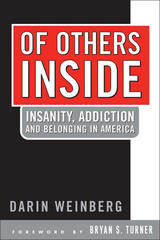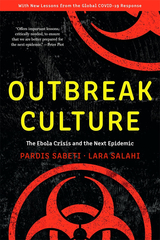6 start with O start with O

Seeking to offer a new sociological understanding of the relationship between social exclusion and mental disability, Of Others Inside considers the general social conditions of homelessness, poverty, and social marginality in the U.S. Weinberg also explores questions about American perceptions of these conditions, and examines in great detail the social reality of mental disability and drug addiction without reducing people's suffering to simple notions of biological fate or social disorder.

Nearly 120,000 people are in need of healthy organs in the United States. Every ten minutes a new name is added to the list, while on average twenty people die each day waiting for an organ to become available. Worse, our traditional reliance on cadaveric organ donation is becoming increasingly insufficient, and in recent years there has been a decline in the number of living donors as well as in the percentage of living donors relative to overall kidney donors. Some transplant surgeons and policy advocates have responded to this shortage by arguing for the legalization of the sale of organs among living donors. Andrew Flescher objects to this approach by going beyond concerns traditionally cited about social justice, commodification, and patient safety, and moving squarely onto the terrain of discussing what motivates major and costly acts of human selflessness.
What is the most efficacious means of attracting prospective living kidney donors? Flescher, drawing on literature in the fields of moral psychology and economics, as well as on scores of interviews with living donors, suggests that inculcating a sense of altruism and civic duty is a more effective means of increasing donor participation than the resort to financial incentives. He encourages individuals to spend time with patients on dialysis in order to become acquainted with their plight and, as an alternative to lump-sum payments, consider innovative solutions that positively impact living donor participation that do not undermine the spirit of the National Organ Transplant Act of 1984. This book not only re-examines the important debate over whether to allow the sale of organs; it is also the first volume in the field to take a close look at alternative solutions to the organ shortage crisis.

A June 1988 symposium at Vanderbilt University gathered leaders in a wide variety of fields to synthesize the current state of knowledge concerning organ transplantation policy and to access policy options. Collected here are the revised papers presented at that symposium; also included is one influential earlier paper on the same topic. Together, they constitute a major contribution to the debate on organ transplantation policy and its moral, legal, financial, and political implications.


An award-winning genetic researcher who helped contain the Ebola outbreak and a prize-winning journalist reveal what it will take to prevent the next pandemic from spiraling out of control.
As we saw with our response to Ebola and Zika—and are seeing now with the disastrous early handling of the coronavirus COVID-19 outbreak—a lack of preparedness, delays in action, and large-scale system-wide problems with the distribution of critical medical resources can result in lost lives.
Outbreak Culture examines each phase of the 2014 Ebola outbreak in West Africa—one of the largest and deadliest epidemics to date—and identifies factors that prevented key information from reaching physicians. Drawing insights from clinical workers, data collectors, organizational experts, and public health researchers, Pardis Sabeti and Lara Salahi expose a fractured system that failed to gather and share knowledge of the virus and ensure timely containment. The authors describe how much more could have been done by global medical and political organizations to safeguard the well-being of caregivers, patients, and communities affected by this devastating outbreak and they outline changes that are urgently needed to ensure a more effective coordinated response to the next epidemic.
Secrecy, competition, and poor coordination plague nearly every major public health crisis—and we are seeing their deadly consequences play out again. A work of fearless integrity and unassailable authority, Outbreak Culture seeks to change the culture of responders.

A Choice Outstanding Academic Title of the Year
“A critical, poignant postmortem of the epidemic.”
—Washington Post
“Forceful and instructive…Sabeti and Salahi uncover competition, sabotage, fear, blame, and disorganization bordering on chaos, features that are seen in just about any lethal epidemic.”
—Paul Farmer, cofounder of Partners in Health
“The central theme of the book…is that common threads of dysfunction run through responses to epidemics…The power of Outbreak Culture is its universality.”
—Nature
“Sabeti and Salahi present a wealth of evidence supporting the imperative that outbreak response must operate in a coordinated, real-time manner.”
—Science
As we saw with the Ebola outbreak—and the disastrous early handling of the COVID-19 coronavirus pandemic—a lack of preparedness, delays, and system-wide problems with the distribution of critical medical supplies can have deadly consequences. Yet after every outbreak, the systems put in place to coordinate emergency responses are generally dismantled.
One of America’s top biomedical researchers, Dr. Pardis Sabeti, and her Pulitzer Prize–winning collaborator, Lara Salahi, argue that these problems are built into the ecosystem of our emergency responses. With an understanding of the path of disease and insight into political psychology, they show how secrecy, competition, and poor coordination plague nearly every major public health crisis and reveal how much more could be done to safeguard the well-being of caregivers, patients, and vulnerable communities. A work of fearless integrity and unassailable authority, Outbreak Culture seeks to ensure that we make some urgently needed changes before the next pandemic.
READERS
Browse our collection.
PUBLISHERS
See BiblioVault's publisher services.
STUDENT SERVICES
Files for college accessibility offices.
UChicago Accessibility Resources
home | accessibility | search | about | contact us
BiblioVault ® 2001 - 2024
The University of Chicago Press









